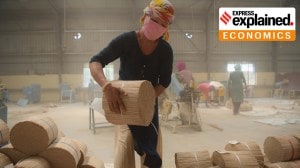Enforcing the 2017 Make-In-India order in government procurement is easier said than done.
Rules framed under the Public Procurement (Preference to Make in India) Order prohibit tenders that restrict or discriminate against domestic suppliers either by specifying foreign brands or setting eligibility conditions around turnover or production capability that may put domestic firms at a disadvantage.

However, over the last three years, an estimated 40% of over 3,500 high-value tenders, which accounts for Rs 64,000 crore, floated by Government departments were flagged as “non-compliant” with these rules by the Department for Promotion of Industry and Internal Trade (DPIIT), the nodal agency for the ‘Make in India’ push, according to records reviewed by The Indian Express.
From lifts to CCTV cameras, medical supplies to desktop computers, records show, departments were turning to foreign brands arguing that these made better economic — and quality — sense than their domestic counterparts.
Many departments have also underlined that some foreign brands specified in their tenders have manufacturing operations in India.
In February 2023, DPIIT found that of the 1,750 high-value tenders – above Rs 1 crore for services, Rs 50 crore for goods, and Rs 100 crore for works – floated since October 2021 by Central government procuring entities, 936 tenders valued at Rs 53,355 crore were non-compliant with the 2017 rules.

The DPIIT’s analysis, presented to a Committee of Secretaries (CoS) chaired by the Cabinet Secretary, showed that when these “violations” were flagged to procuring entities and respective ministries, corrective action was taken in 180 tenders and “no response” was received in 706 cases, records show.
Story continues below this ad
In 2020, the 2017 order was further tightened by introducing a method of classification: as a norm, departments should only source from local suppliers with local content more than 50% if there is sufficient local capacity and competition; if not, then they can also source from suppliers with local content between 20- 50%; suppliers whose local content is below 20% were classified as “non-local suppliers” and allowed only in exceptional cases, like a global tender.
By November last year, soon after the 10th anniversary of the flagship ‘Make in India’ initiative, the number of high-value tenders that didn’t conform to the 2017 order increased to 1,502 out of 3,590 tenders scrutinised (42 per cent), amounting to Rs 63,911 crore.
A total of 982 tenders (65 per cent) were found non-compliant for not incorporating provisions of the 2017 order; 450 tenders (30 per cent) for specifying foreign brands; and 152 (10 per cent) for having restrictive turnover requirements.
In 2019, Principal Secretary to the Prime Minister and DPIIT Secretary had instructed top bureaucrats across ministries to “advise their procuring agencies to desist from such practices,” records show.
Story continues below this ad
The departments of Military Affairs and Atomic Energy were yet to update their procurement policies to align with the 2017 order, DPIIT told a review committee in November 2024, records show.
As of April 1, 2024, the Department of Telecommunications, along with the ministries of Electronics and Information Technology, Civil Aviation, Petroleum and Natural Gas, Textiles, and Steel, had not updated their procurement rules to incorporate the 2020 amendments to the 2017 order.
The DPIIT and the listed departments and ministries did not respond to requests for comment.
In 2022, DPIIT compiled common tendering practices across ministries that it called restrictive and discriminatory toward local suppliers.
Story continues below this ad
For example, foreign brands such as Cisco, NEC, Alcatel, and Siemens were being specified in tenders for telecom products; while HP, Dell, and Lenovo were being specified for IT products.
Similarly, tenders for the supply of lifts were specifying foreign brands like Otis, Kone, Mitsubishi, and Schindler. Even though these companies have manufacturing capacities in India, as noted by some procuring entities in meetings with DPIIT, specifying brand names in tender documents violates the 2017 order for being restrictive and discriminatory through exclusion of other domestic brands.
In 2019, the Container Corporation of India Ltd (Concor) justified limiting a bid for procurement of lifts from just three companies–Schindler, Otis, and Thyssenkrupp–as they needed to replace old lifts on “an urgent basis”. Concor noted that these are “established brands and all have their manufacturing units in India”.
The clarification came after Gujarat-based Omega Elevators filed a grievance against the bid and “requested that they must also be given fair and equal opportunity to participate in the tender,” records show.
Story continues below this ad
“The main thing is, there has to be a supply response from the domestic suppliers. There may be some cases where errors have also been made. In other cases, foreign brands might be specified because they’re the only ones which meet the technical requirement. A mandate doesn’t create a supply response. It just raises costs and undermines the quality and functionality of things in some situations,” a former senior official said on the condition of anonymity.
At the CoS meeting in February 2023, the Housing and Urban Affairs Secretary said that the Central Public Works Department (CPWD) was facing issues in procuring quality made-in-India lifts for its projects.
At the meeting, the Finance Secretary also noted that violations like requirement of excessive turnover or mentioning a specific brand not only violated the 2017 order but also the government’s General Financial Rules (GFRs), which oversee use of public finances.
Then, the CoS directed ministries to “fix responsibility in case of violation” of the order and “take stringent action against officers responsible for such violations”.
Story continues below this ad
It also flagged “the inordinate delay in reporting action taken by procuring entities” on grievances received, which increased by over four times from 556 in October 2019 to 2,190 in February 2023.
Again, in April 2024, a review committee noted that only three ministries—Railways, Petroleum and Natural Gas, and Power—had been submitting monthly compliance reports to DPIIT since it made reporting mandatory in August 2023.
Until November, a total of 18 ministries and departments had not provided any action taken reports.
In 2021, AIIMS, Jodhpur had cancelled a tender that listed a suture brand trademarked by Johnson & Johnson in its technical specifications after Aurolab Trust in Madurai filed a grievance.
Story continues below this ad
The Health and Family Welfare department also issued a show-cause notice to AIIMS, Jodhpur for having a restrictive turnover requirement of Rs 1000 crore for the supply of surgical sutures worth Rs 2 crore in a tender issued in February 2022.
The Confederation of Indian MSME in ESDM & IT also managed to get a tender for the supply of desktop computers floated by Balmer Lawrie and Company Ltd cancelled for making foreign certifications mandatory for local suppliers.


































